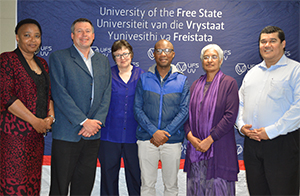Latest News Archive
Please select Category, Year, and then Month to display items
23 April 2020
|
Story Cornelius Hagenmeier
|
Photo Pixabay

The iKudu project, which is an European Union-funded Capacity Building in Higher Education (CBHE) project, has recently launched its blog, which aims to amplify the diverse voices of all iKudu stakeholders. In this space, members of the iKudu team will regularly share their views on the project and related international education topics.
The iKudu project focuses on developing a contextualised South African concept of Internationalisation of the Curriculum (IoC), which integrates Cooperative Online International Learning (COIL) virtual exchanges. The project was launched by the UFS in 2019, together with nine European and South African partner universities. It is funded by the European Union’s Erasmus+ programme with EUR999 881 (approximately R20 million) and is implemented over a three-year period.
The iKudu project is based on the fundamental belief that it is necessary to rethink internationalisation in an uncertain world. First, it is crucial to recognise and transform the power dynamics underlying international academic collaboration. Second, it is essential to develop pedagogies that allow every student to participate in international education, integrating technology where appropriate.
However, while all stakeholders agree on the fundamental tenets of the project and its principal goals, all iKudu stakeholders contribute different perspectives. In the blog, the iKudu stakeholders will provide a space for intellectual discourse on the project and related international education topics, which will allow constructive and critical engagement.
The link to the blog can be found at: https://www.ufs.ac.za/ikudu/ikudu-blogs/Transforming-Curricula-through-Internationalisation-and-Virtual-Exchanges
Qwaqwa Campus launches new degree in Community Development
2016-11-29

Photo (from the left): Morongoe Mohaleroe
(Department of Social Development), Albert Schoeman
(Assistant Dean: Faculty of the Humanities),
Dr Elsa Crause (Campus Vice-Principal:
Academic and Research), Grey Magaiza
(Programme Head: Community Development),
Dr Margie Maistry, and Prof Darren Lortan
(both from Durban University of Technology).
From 2017, the Qwaqwa Campus of the University of the Free State will offer a new professional degree in Community Development. This was revealed during the launch that was recently held on the campus.
Speakers acknowledged the positive contribution the new degree was expected to make in the region, especially in mobilising the civil society to join hands with the government in improving the quality of life in South Africa.
“There has always been a dire need for such a degree in this part of the country,” said Morongoe Mohaleroe, the Thabo Mofutsanyana District Director in the Department of Social Development.
“Our department is working hard at both national and provincial levels to professionalise this sector, and the qualification will definitely help in that regard,” she said.
Mohaleroe also thanked the campus for supporting her department with community-based research and studies by students.
Speaking during the launch, the Campus Vice-Principal: Academic and Research, Dr Elsa Crause, said the campus was proud to be the first in the country to offer this professional qualification.
‘‘What has brought us all here today, is history in the making,’’ she said to an audience consisting of a broad spectrum of stakeholders, including government and civil society structures like Save the Children and World Vision.
“Our campus will be the first in South Africa to offer this type of degree and a maximum of only 35 students will be accepted,” she added.
For more details, prospective students may contact Grey Magaiza (Programme Head: Community Development) at magaizag@ufs.ac.za or +27 58 718 5419.